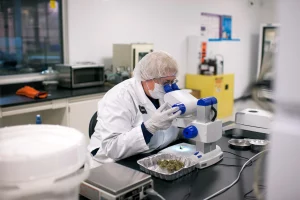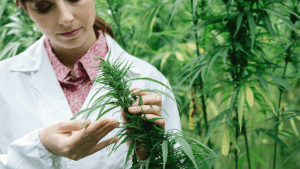English
In this article, we look at which countries are leading the way in cannabis research. From a global research perspective, cannabis is already starting to interest many more institutions who want to know more about its medicinal properties. Legislative restrictions have many times made it difficult to conduct qualified scientific studies in the United States, but that does not mean that other countries are falling behind.
The following is a list of the top four countries that are ahead of the curve in cannabis research and are currently taking proactive steps to explore the potential benefits of cannabis.
The Netherlands
When it comes to places known for cannabis, Amsterdam, the capital of the Netherlands, is always at the top of the list. It makes sense that a country known for its cannabis coffee shops might know a thing or two about the science of marijuana. The Netherlands is one of only three countries in the world with the benefit of a nationally sponsored medical marijuana program. The other two are Canada and Israel. Strong government support has helped the Netherlands become the standard for the purging of cannabis from demonization.
In 2001, the Medical Cannabis Authority was established and in 2003 the medical marijuana programme was launched. Since then, the Netherlands has become “a pioneer in medical cannabis applications”.
Now, in 2021, the country is taking the next step and is calling for new varieties of cannabis to be sold to medical marijuana patients, asking for feedback, which is very important. CannNext , a cannabis research company, has been searching for better medical cannabis varieties for patients.
Eric Uleman, CEO of CannNext, said the way to determine the variety will be based on individual patient preferences and how cannabis interacts positively with the patient’s health.
“The choice of strain will be determined by patient experience and preference. To this end, CannNext will work with patient associations and research institutes to determine which strains are most desirable,” said .
Israel
Israel, touted as the “Holy Land of Medical Marijuana”, according to US News and World Report , is considered the most innovative country in the world when it comes to cannabis research. This claim to fame would not have been possible without cannabis research pioneer Raphael Mechoulam.
The renowned Israeli organic chemist and professor of medicinal chemistry at the Hebrew University of Jerusalem published his groundbreaking discoveries on the structure of cannabidiol ( CBD ) and tetrahydrocannabinol (THC) in 1963 and 1964, followed by clinical trials with CBD published in 1980.
Mechoulam’s research included the co-discovery of the endocannabinoid system and that the human brain produces its own cannabinoids. Since then, the country has funded scientific studies on cannabis, putting Israel at the top of the cannabis research ladder.
In 2017, the Hebrew University’s Pharmacy Department established the Multidisciplinary Center for Cannabinoid Research. The center, which employs 27 cannabis researchers, builds on Mechoulam’s early research. Cannabis research being conducted in the country focuses on the potential role of marijuana in treating various medical conditions.
Canada
When it comes to a wide-open space with full access to legal cannabis, Canada is another haven for cannabis research. In 2018, Canada became the second country to fully legalize cannabis, and the largest economy to do so at the time.
The entire legalization process kicked off with the election of Prime Minister Justin Trudeau, who ran in 2015 on a promise of recreational cannabis legalization. In preparation for the launch of Canada’s cannabis program, a coalition of more than 1,800 Canadian scientists and researchers sent a letter to Trudeau demanding that the government facilitate the study of cannabis.
In 2018, the Canadian government decided to commit $1.4 million to 14 scientific projects that plan to study the effects of nationwide cannabis legalization . According to reports, some projects will include the potential impacts of cannabis use in Indigenous communities, pregnant women and teenagers, while other projects will examine how cannabis use changes after legalization.
Czech Republic
Home to castles, medieval buildings and the International Cannabis and Cannabinoid Institute (ICCI), the Czech Republic is a world leader in evidence-based cannabis research and is known as an international training centre. For this reason, the Czech Republic ranks among the leading countries in cannabis research.
The ICCI took off in 2015 when Americans for Safe Access (ASA) , its sister Prague-based group KOPAC and Dioscorides Global Holdings (DGH) were joined by Czech Health Minister Svatopluk Nemecek to announce the creation of a new research centre.
The Centre is unique in that it offers a variety of research services and is a self-proclaimed Centre of Excellence. According to the company’s website, Center for Excellence “refers to an organization that brings together various institutions (universities, high-tech companies, associations) that combine their capabilities to provide services to a wide range of entities around the world interested in the development of cannabis and cannabinoids as medicine.”
Collaboration is what brings ICCI’s mission to life.
“ICCI’s core work is to provide scientific tools to public and private institutions around the world. The purpose is to enable the scientific investigation of the relationship between the bioactive compounds of cannabis and the effects on the human body in the treatment of specific syndromes and, in the future, systemic health disorders,” said ICCI Director General Pavel Kubu.
ICCI’s three areas of research focus are Biomedicine, Life Science and Policy Science. ICCI uses preclinical studies and observational research to fill the knowledge gap on cannabis as an effective evidence-based medicine.
What about American cannabis research?
Why isn’t the country with the largest cannabis market in the world on the list? Marijuana research in the United States has been curtailed due to the classification of cannabis as a Schedule I controlled substance. Because of this designation by the federal government, researchers must obtain approval from the Drug Enforcement Agency (DEA), the Food and Drug Administration (FDA), and the National Institute on Drug Abuse (NIDA).
With this designation on cannabis, any legal scientific research is based on a small pool of availability. Researchers wishing to study the effects of cannabis are currently limited to obtaining cannabis from a single source under contract with the National Institute on Drug Abuse – University of Mississippi.
In recent years, there has been a push to open up more avenues for cannabis research . The DEA has responded by promising more licensing for research and calling for a 30 percent increase in cannabis production over the previous year for research in 2020.
According to recent reports from the US, the DEA is expected to authorise more cannabis research, resulting in more grants and funding in this medically important sector. Let’s be surprised what amazing findings of scientists may move towards the legalization of cannabis for medicinal purposes in a global perspective.
Published by Jan Veselý
19/11/2021choose and buy cannabis seeds from our offer
our pleasure
































